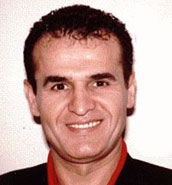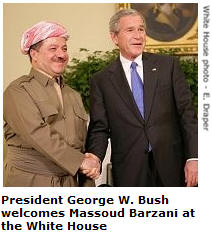Untitled Document
 |
|
Dr. Qadir is charged of 'insulting' Massoud Barzani, head of the U.S.-led Kurdish Democratic Party
|
A lot of conflicting reports have been circulating about the legal
case involving Dr. Kamal Sayid Qadir, who was arrested according to law and
an established court system for writing an article criticising the puppet U.S.-led
government in Iraqi Kurdistan.
In accordance with law no. 21, article 1, enacted by the Kurdistan National
Assembly (KNA) in 2003 pertaining to defamation of public institutions, Dr.
Qadir, a leading Kurdish academic and one of the region's most prominent writers,
has been sent to jail for 30 years for harshly criticising leaders of the U.S.-backed,
KDP.
Representatives of many International Human Rights organizations stressed that
KRG, now facing pressure from NGO's and UN instruments, angered by KDP's inhuman
act(s), must release Dr. Sayid Qadir if it seeks carrying on with its bid to
become an applicant for democracy.
And some analysts believe that the arrest of Dr. Sayid Qadir comes as a crucial
test of KRG's relations with the international community on one hand, and the
KRG protection of freedom of expression on the other hand.
Dr. Sayid Qadir is accused of 'insulting' Massoud Barzani, head of
the U.S. backed Kurdish Democratic Party, KDP, one of two parties that rule
Iraqi Kurdistan, and publishing critical views of the system in the region.
Kamal Sayid Qadir wrote that “if a writer was jailed for 30 years for
exposing government corruption in Iran or Syria, there would be outrage in the
U.S. and Britain and demands for military strikes. But when that happens in
Iraq there is silence.”
Despite the apparent deterioration in the overall situation in IRAQ,
the U.S. PRESIDENT
GEORGE W. BUSH and the British Prime Minister TONY
BLAIR maintains that steps taken by both government are achieving their
intended goals, bringing “freedom and democracy” to Iraq.
And self rule areas have been held up as a model of post-SADDAM IRAQ.
On a visit to Kurdistan in October 2005, Dr. Qadir, 48, was kidnaped by members
of Parastin, the security forces belonging to the KDP.
Qadir, who used to live in Vienna, has become a leading critic of the corruption
and nepotism that has become a feature of daily life in Iraqi Kurdistan.
Last year he wrote, "Kurdish parties have transformed Iraqi Kurdistan
into a fortress for oppression, theft of public funds and serious abuses of
human rights like murder, torture, amputation of ears and noses, and rape."
Kurdish authorities were angered by his article, calling Qadir for a a meeting
with officials then arresting him.
On 16 December 2005, he wrote from his prison cell in the Iraqi Kurdish city
of Arbil, saying "I was arrested by a group of armed people on 23 October
2005 in Arbil. I was kidnapped without being asked for my name, or told what
I had been accused of or where they were taking me. And to date, I still have
no idea who issued a warrant for my arrest."
Qadir was denied proper legal representation and ill-treated during his arrest
and interrogation.
In an impassioned plea from his cell, Dr. Sayid Qadir, who is now on hunger
strike, wrote, "Oppression is one of the main features of human history…
I have now become a small sample of this oppression, deprivation and violation
of my very basic rights as a human being since I have been detained."
Following the U.S.-led March 2003 occupation, Dr. Qadir wrote a damning indictment
of the U.S. and British policies in the country, "It is maybe pure coincidence
that the history of modern IRAQ
has ended as it began, namely with the British occupation beginning from
the south of Iraq after the WORLD
WAR I, ending with the invasion of British troops, this time under the leadership
of their American allies," warning, "If they start to play the role
of an arrogant occupant and show no respect for local customs and the will of
the people, they will very soon face resistance from the Iraqi people —
and it will not be an easy task to rule 25 million people."
KRG leaders in Arbil hate “democracy and freedom of speech”, but
what they shouldn’t ignore is the fact that people are the power behind
their regime.



